“The more I do it, the more accurately it reflects who I am.” 26-year-old Ben Thomson is the first to admit (multiple times) that he’s very lucky to be where he is. Not everyone has the good fortune to possess the talent required to move beyond mere competence with a medium insofar as to superimpose a piece of yourself on to the fruits of your labour. It’s one thing to choose to play music as an outlet, but being able to project your own personality through the way you handle others’ records and to make it about the thought, care and skill that go into moving a dancefloor rather than the act of moving it is entirely different. His career DJing as Ben UFO started coming together regularly with the Ruffage Sessions on Sub.FM in early 2007, and over the years his increasing confidence and proficiency are becoming just as evident on the listener’s end. This transparency has not gone unnoticed at Truants, and surely contributes to his esteemed reputation across the board.
Every release from Hessle Audio, the label he co-founded and runs with longtime friends Pearson Sound and Pangaea, has been worth coming back to – beyond releasing Pangaea and Pearson’s own records, they’ve also shared releases like Objekt’s staggering “Cactus / Porcupine,” James Blake’s “The Bells Sketch” EP, this, Joe’s classic “Claptrap / Level Crossing” and more. Next up is Pangaea’s “Release” double-EP (due out October 29th), and we couldn’t be more excited. We let Ben into our homes every other Thursday when he hosts the Hessle show on Rinse.fm, one of the few shows we look forward to catching every single time. We actually listen to what he says on Twitter, because he holds a philosophy degree rather than a Nandos VIP card. As we’ve become conscious of all the above, we started to feel like we knew him, and he’s been the subject of many attention campaigns since – all out of love, of course. When we finally had the chance to spend time with him during his first North American visit, we realized that there were endless things that we didn’t know. He was far more modest than we would expect for someone who is so regularly in the spotlight, but like he said himself, the more he plays the better it reflects who he is, and his work speaks for itself. Our questions were met with honesty and insight, and we’re happy to be able to share them with you below.
ASL?
Ben UFO: “26 / M / Montreal.”
Could you tell us a bit about your musical background? What did you grow up listening to in your parents’ living room?
“I grew up with my dad’s record collection, which is fairly expansive. He actually works in classical music, which I guess must have made an impact when I was younger. The stuff I remember is the music he played during long car journeys, visiting family in Yorkshire and Scotland. He had a weakness for jazz fusion, so I grew up listening to a lot of Steely Dan records and stuff like that. I always namecheck Steely Dan because I figure that’s kind of marginally credible, and I still listen to them… there’s a Kode9 tune actually that references them. It used to appear in his live set but I’ve always hoped it would come out eventually.”
Do you consciously try to keep your music and private lives separate, or have they become inextricably linked?
“I definitely did try to maintain that kind of separation for a little while, especially when I worked full-time on top of that. I have a tendency to compartmentalize things anyway, put things into little blocks and categories, but I try and avoid that now. It was having a destructive effect on the way I lived as the different aspects of my lifestyle started to bleed together.”
Before music became a full-time occupation for you, or before you realized that that was what you wanted to do, what did you want to do?
“I never consciously made the decision to do music full time… I’d been working part-time for a while in a really flexible job that allowed me to take loads of time off, and eventually I was taking so much holiday leave they ended up making the decision for me. So far it’s worked out well, I’m very lucky.”
As a DJ, you could say that a balancing act occurs between selecting and entertaining – how often do you find yourself balancing these two aspects of the job, if there is a balance?
“I’m not a natural performer or entertainer at all really, I don’t see myself in that way. One of the things that’s nice about DJing, in the venues that I like to DJ in at least, is that most of the time the music tends to be the focal point, and it’s easy for the DJ to fade into the background. When I end up getting into performance mode it’s only happening because I’m enjoying myself, and because the music is going down well already. I need to feel comfortable enough to lose myself in what I’m doing.”
How often do you feel comfortable playing whatever you want, even if it’s not be in line with what the crowd necessarily wants?
“I’ve found myself in this fortunate position where I seem to have cultivated a following that would be actively disappointed if I didn’t play music that they’re not expecting. Radio is responsible for that I think – doing a radio show every couple of weeks is something that forces you into searching for stuff that you might not play otherwise, so when I find myself in gig situations I have this really wide pool of music to draw from. Basically if your set is never the same, then people come to expect you to play different stuff. That means hopefully that when I do play unexpected things then people tend to not find it alienating. I hope so, anyway. I’d find DJing really awkward if I couldn’t play exactly what I wanted to play.”
In the past you’ve said that your self-esteem is wrapped up in how the crowd is responding – so, if a crowd isn’t necessarily responding how you wanted them to, how do you prevent that connection from souring?
“I guess, generally, it’s easier to enjoy what you’re doing if you can see that other people are getting a lot of enjoyment out of it too. A lot of different stuff feeds into your perception of what’s going on though… your mood that day, how much sleep you’ve had… it’s hard to separate it all out and analyse it properly. I’m concerned about getting to a point where I’m placing too much emphasis on the reactions of the crowd, and that I’ll subconsciously start to play music to cater towards audience expectations, but at the moment I think I have a pretty strong sense of what I like, and what I want to represent. At the moment I play to a pretty wide variety of audiences from a variety of musical backgrounds, and that helps – it’s less easy to fall into a boring routine if people’s expectations are varying from night to night.”
Theo Parrish once identified an “autopilot” mode – he refers to this as a zen-like meditative trance-like mood.
“It took me a while when reading that to figure out if he was talking about it in a positive way. He definitely was though, right?”
Yes, or at least in a factual way, where it’s something that occurs inevitably. What I’m wondering is whether you agree with what he’s getting at and can identify it in your own experiences of DJing, and if so, how often do you find yourself in this zone?
“I definitely do identify with it and I’d assume that he is talking about it in a positive way if only because that’s definitely how I feel about it. It’s kind of what I was trying to get at before, when I mentioned the sense of freedom I feel to perform once I’m lost in a set that’s going particularly well. You get into this state where you’re almost not thinking about what you’re doing. I would assume that most people who are involved in a creative pursuit could identify with that in some way. You read about a lot of artists saying that when they’ve produced their best work, it’s almost as if something’s taking control or taking over, working through them. That seems like a slightly self-important way to talk about playing other people’s records, but I do identify with that and try to seek out those moments. It tends to happen when I have a little longer to play – I usually try to seek out longer sets where I can really immerse myself in what I’m doing, because that seems to facilitate that feeling of… I don’t know, that feeling of calm.”
Would you say it’s a natural mode for most DJs to get into? And do you think there are circumstances that prevent it?
“I don’t think it would happen if I was sticking rigorously to a set-list. If I was more of a performer in the way that we were talking about before, performing something pre-planned and trying to live up to the perfect example of that performance or whatever, then I’d find it difficult to get into that state. Technical difficulties and bad soundsystems are obviously a hindrance too.”
As far as listening to music goes, you have probably a more – maybe not rigorous per se – but at least a more methodical way of listening to things compared to the average person. We were wondering if you had a pattern to your listening – do you listen to something once to see if you enjoy it and listen to it a second time to see if it’ll be useful to you?
“There probably is a pattern to it, certainly with demos and music I get sent, just because there’s so much of it. You must find this as well, right? You start to identify characteristics of music you’re into and start searching for those, you set up filters unconsciously. I try to avoid that as far as possible because it’s a pretty joyless, utilitarian way to experience new music, but I’m sure it happens without my meaning it to. I listen to non-dance music these days a lot more charitably than I listen to dance music, I guess because I’m exposed to it less and there’s no pressure that I have to be looking for things that could be useful. Dance music is so tied to specific contexts for me now that I find myself listening to it at home less and less.”
A common compliment paid to your mixing is that it helps people reassess music in a different context, and where they might have written something off before, they’re able to come back to it again and appreciate it. How do you prevent this ‘writing off’ happening for yourself, even if you have identified characteristics of what you already like?
“I really hope that my mixing does do that, that would be rad. I’ve had so many of those kinds of epiphanies listening to other people mix… When I was growing up I was not into house music at all, I wasn’t even into garage really at the time, and all it took was specific experiences at the right time to have my view of those musics completely transformed. It’s less about being worried about writing stuff off, and more about trying to keep yourself open to it after you’ve written it off, if that makes sense. I don’t know. People need their opinions and their identities, but if they can keep themselves open to reassessment then that’s cool.”
Does a song’s potential for being useful in a set play a part at all when you’re preparing crates, or do you put in what you like and figure it out later?
“One of the reasons I like to play vinyl where possible is that it makes it less easy to approach music in that super methodical way. When I’m using Serato in a situation where I need to use it and nothing else, then inevitably I do end up being exposed to things like BPMs, waveforms… when those things are right in front of you there’s no way that it won’t feed into your mixing. When you’re faced with a bag of vinyl you end up going by feeling more. You have to know your tracks, obviously, but if you have a bag of records in front of you it gives you a little more creative freedom. That’s my experience of it anyway, and that’s the main thing I still like about the format.”
Before or during a tour abroad, how do you go about preparing your sets? What are some of the harder aspects of selecting when you’re on tour?
“I’m lucky being based in the UK – for the most part, I travel around Europe and tend to only do two or three shows at a time before coming home. I can always re-pack my bag and sift through things. For a trip like this, in Canada, it’s a little bit harder. I’m doing a run of dates and the temptation is to play similar sets in each city. There’s no fun in that, so when I don’t have vinyl with me I’ll delete the Serato crate that I’ve been working on after the show and start on a new one. That stops me from relying on the same sets of tracks or transitions. My digital music isn’t particularly well organised, and so far I think that’s actually been beneficial.”
How much time do you spend listening to new things compared to the time spent listening to things that you already know you like?
“That’s a strange one… I don’t produce so I feel a sort of pressure to justify my position, and I feel that when I do DJ it has to be good. I have to make it worth people booking me, and in order to do that I have to spend a lot of time looking for new music. I was trying to figure out whether or not the techniques I use for digging have changed and I’m probably more reliant on the internet than I used to be. I’m not sure if that’s a good thing. What I like about going to record shops is that I’ll always end up going away with something I don’t already know. Discogs and YouTube culture also generally facilitates a certain kind of listening, I think. I’ve noticed it recently, for example a lot of the tracks we’ve been releasing on Hessle Audio lately are tools in quite a traditional sense. For the most part, they’re tracks designed for DJs to work with, but when people are primarily consuming music via YouTube, it’s in these isolated bursts where the temptation is to look at everything in the same light, as if all the dance music ever written was designed with a singular purpose in mind. I think that explains a lot of YouTube comments sections – people expressing their disdain when music written with a specific context in mind doesn’t work quite so well in their preferred context, which is sat behind a laptop.”
What do you do when you’re (if ever) temporarily ‘burned out’ with music on the whole? Do you ever feel you need a break from constantly having to be on point with new sounds?
“I definitely feel overwhelmed from time to time. It tends to be when I’ve done a few shows that I’m not happy with, so I guess that taps back into what I was saying about self-esteem. If a set goes badly, I feel like I’m doing my job badly, and when people don’t like or are blasé about what I’m doing, it makes me wonder what it is about the music that I love so much. But those thoughts all disappear as soon as I have one good show. The internet can make you feel this constant pressure to keep up, but it’s a trap. I get much more out of listening to music thoroughly and really dedicating my attention to it, as opposed to skimming a load of tracks before a set. I try to make listening to music as unpressurized an experience as possible.”
You’ve said that your first exposure to jungle/drum&bass was through Metalheadz affiliate Bailey’s show on 1Xtra. Since radio has had such a big impact on your own musical curiosity, does that memory inform your own approach to playing your Rinse shows?
“I definitely value radio more than I would if I hadn’t grown up with it. Maybe I treat radio with a little more reverence than I should because it helped me form my ideas about music.”
From the Ruffage Sessions on Sub.FM back in the days to your current Rinse show, have you experienced a change in the dynamics at play when you’re hosting a radio show?
“Definitely. If you listen to the early Ruffage Sessions we were quite clearly inexperienced, super enthusiastic and happy to be doing what we were doing. Even the pitch of my voice was higher when we were on Sub.FM, I felt as though I was straining to be heard. There was this naive, very audible enthusiasm in what we were doing. The more I’ve fallen into a routine with radio, the more confident I feel with it and the more it’s a reflection of how I behave normally with other people. When I travel around now people say that my voice on the radio is similar to my voice in real life, and that definitely hasn’t always been the case. That’s the big change: the more I do it, the more accurately it reflects who I am.”
What are some changes in your approach that you’ve witnessed going to a much broader audience at Rinse, and what has stayed the same?
“I felt a pressure to live up to the standards of pirate radio’s history when I moved on to Rinse. When you’re doing something on internet radio, there’s definitely a smaller audience and you don’t feel like you’re being scrutinized to the same extent. The dynamic of anything changes when there’s a lot of people watching but that’s positive too. I try not to concern myself too much with what’s appropriate and what’s not, but I definitely feel as though I want to justify where I am. Rinse is something that has been going for sixteen years and I need to be aware of that, and the fact that I have a small role in something much bigger.”
With a lot of pirate shows disappearing, people are approaching present-day mainstream radio less positively than they used to – how do you keep looking forward to participating in radio?
“There’s definitely not the same presence of FM pirate radio in London as there was. Back in the day when you scanned the radio dial travelling through London you could find so many stations and such a breadth of music, and that seems to be disappearing. It’s sad. I don’t know though, I think Rinse’s approach is a good one – they’re a community station as opposed to a commercial station. They do their outreach work with the Rinse academy and kids in the local area, they run events… they do more than just radio, and they do more nowadays than they’d be able to as a pirate. It’s a difficult question to answer because it’s in flux, but I still feel very positively about doing radio, and it allows me to play so much music that I wouldn’t necessarily play in clubs.”
Do you see yourself doing that forever, playing on the radio?
“I can’t see myself stopping anytime soon.”
Do you listen to radio shows a lot besides those of your friends? If so, what are some of your favourite shows and why?
“I listen to radio in the kitchen mostly, that’s where our best-sounding FM radio is. I sent the Swamp81 guys a picture of a ragu I was cooking the other day whilst listening to their show on Rinse… I definitely associate radio with listening around the house and moving around, letting my attention drift in and out. I’m trying to think of what stations we normally have on… We used to have LiveFM on a lot but the FM dial has been stuck on 106.8 for a while now. In terms of what we pick up digitally, the show I end up listening to more than any other is this show called Late Junction on Radio 3, just because I usually end up eating quite late. It’s a broadly experimental show that takes in all sorts of stuff that I’d never be exposed to otherwise. They play lots of traditional music from around the world and loads of contemporary classical music as well. You wouldn’t get that kind of programming on any mainstream radio station outside of the BBC.”
As someone who runs a label and focuses on DJing, you occupy a more uncommon situation of objectivity and a globally broad perspective in the community, and you get to interact with a lot of different people. Because of this, we imagine that you have a lot of people in music around you and see a lot people play out on a regular basis who usually only have one aspect of their talent highlighted. Are there any producers that we’re overlooking as DJs (or vice-versa), from your perspective?
“I guess I’m a little biased towards them, but I immediately thought of both David and Kev (Pearson Sound and Pangaea), Neither of them have as strong a reputation for their DJing as they do for their productions but I think they’re both amazing DJs. If you go and see either one of those guys play, there’s a real consistency and they play out so much different music. You won’t necessarily even hear that much of their own music, but because they’re known for producing tunes people don’t necessarily focus on that quite so much. They both spent more time DJing when they were younger than they did producing, so it’s natural I guess that they’ve held onto that. You can generally tell when people have been DJing longer than they’ve been producing, and you can tell when a producer has learned to DJ quickly so they can start touring. Maybe it’s a generational thing to an extent, our generation might have been one of the last where DJing would have been a more approachable activity than producing. If I was sixteen now I could either spend loads of money on DJing equipment, records, CDJs or whatever, or I could get a bunch of production software for next to nothing and start making music. I know if I was younger, I’d probably have opted to make music.”
Has working in ‘nightlife’ changed the way that you experience clubbing? Has it changed your perspective on it at all?
“Yeah, I don’t know if it’s through working in clubs but the thing that alters your perspective most of all is just being in a lot of them and seeing how they function. To go back to what Theo Parrish said about that meditative autopilot state that DJs can find themselves in, the crowd can often fall into that state too. Do you know what I mean? If you see a DJ and they’re playing a selection of tracks and you’re not actively scrutinizing what they’re doing, you’re with them and you’re moving with the music. I still go out and see DJs where I find myself in that state, where I find myself forgetting my immediate physical surroundings and get to enjoy this weird headspace.”
Do you still experience those club nights where you feel overwhelmed in a good way often, or has being out so much diluted the experience?
“It comes in waves. I find it more of a struggle to energize myself to go to clubs but when I do go to them I still tend to enjoy myself. Most recently I had a great time going to see Marcellus Pittman recently, around the corner from my house in a snooker hall. He played almost entirely disco, and it was a really, really good time.”
Have you ever visited another city, country, or a place outside your comfort zone that has exposed you to new sounds, and changed your way of thinking?
“I get to play such a diverse array of nights that I quite often find myself in those situations. For example, when I played in Vancouver recently, pretty much the first thing that happened was that a couple of guys in the collective that had booked me presented me with a bunch of tapes that they’d made with their friends… really strange dusty house stuff with an aesthetic leaning towards noise… It feels like a really open time at the moment with so many different kinds of music bleeding into one another, with very little of that purist tribalism that’s associated with genre. People have written about that as though it’s a problem, worrying that this kind of approach would make it less easy to form productive, local scenes, but I don’t think that’s true… In Vancouver for example, the people involved in that scene were linked by the studio space they shared, and the club nights they ran.”
A lot of creatives have some ritualistic behavior that can help them get into their zone, we wanted to ask if there was anything you always try to do before a set that keeps you grounded while you’re uprooted on tour?
“I hang my clothes up in the hotel room. I try and make a little home for myself. I have quite a lot of compulsive tendencies, I arrange things very neatly at home, put things on my bed in little piles and stuff. [laughs] I try and create a comfort zone.”
What is one thing that you always strive to do, that keeps you going? Even if one day you’re as big as Skrillex, what will you always try to do?
“Probably walk around by myself. It’s something I try and make time to do in cities at the moment, to just stroll around and try to get a feel for wherever it is I’m playing. Skrillex is… well… I find it hard to imagine that there could ever be anyone else like him. He’s reached the peak of human achievement and development, he’s the logical endpoint.”
Who is one person, dead or alive, that you would enjoy DJing back-to-back with?
“There are so many people… Could they be fictional as well? I don’t know why this popped into my head but I want to pick the alien in The Man Who Fell To Earth, I figure he’d have an interesting perspective. In the book he becomes an alcoholic so he’d probably fit the lifestyle quite well.”
And who is one person, dead or alive, that you’d like to have MC your dream Rinse show?
“Ha! I’ve never had anyone ask me that before. I don’t know. Edgar Allen Poe.”
–
Photos by Will Bankhead.
Follow Ben UFO on Facebook here, and on Twitter. Check out Hessle’s nearly complete discography here. The Hessle Audio show airs on Rinse.fm every other Thursday from 11pm-1am GMT (6pm-8pm EST), online at rinse.fm, through iTunes, or 106.8FM in London.

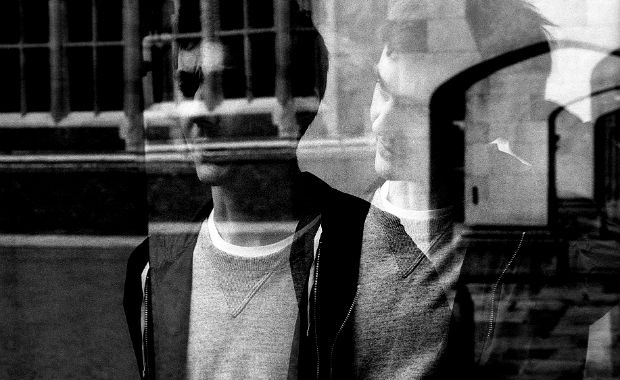
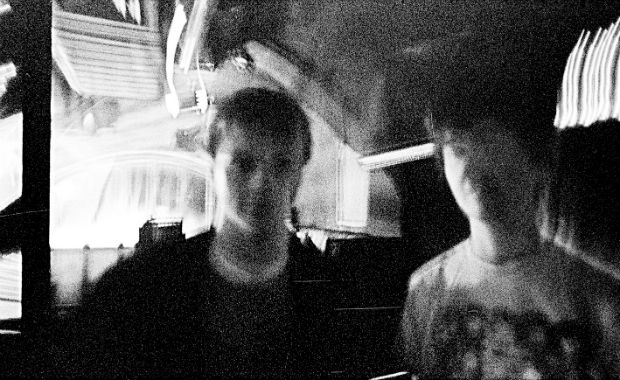
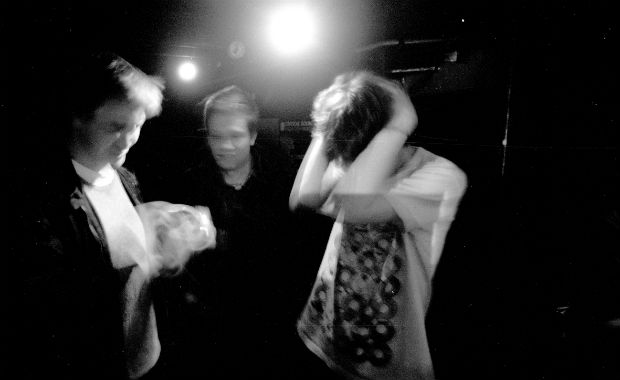
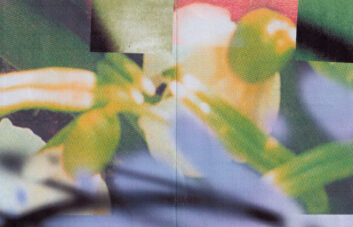
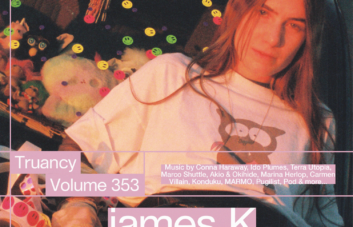
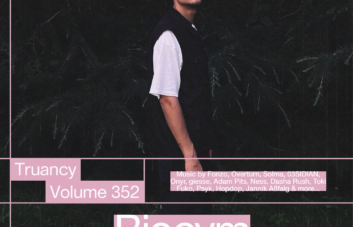
haha edgar allen pon di mic live and direct
“I figure he’d have an interesting perspective. In the book he becomes an alcoholic so he’d probably fit the lifestyle quite well.”
Love this.
The collective he is talking about in Vancouver is called Mood Hut. He came there to play of of their Love Dancing parties.